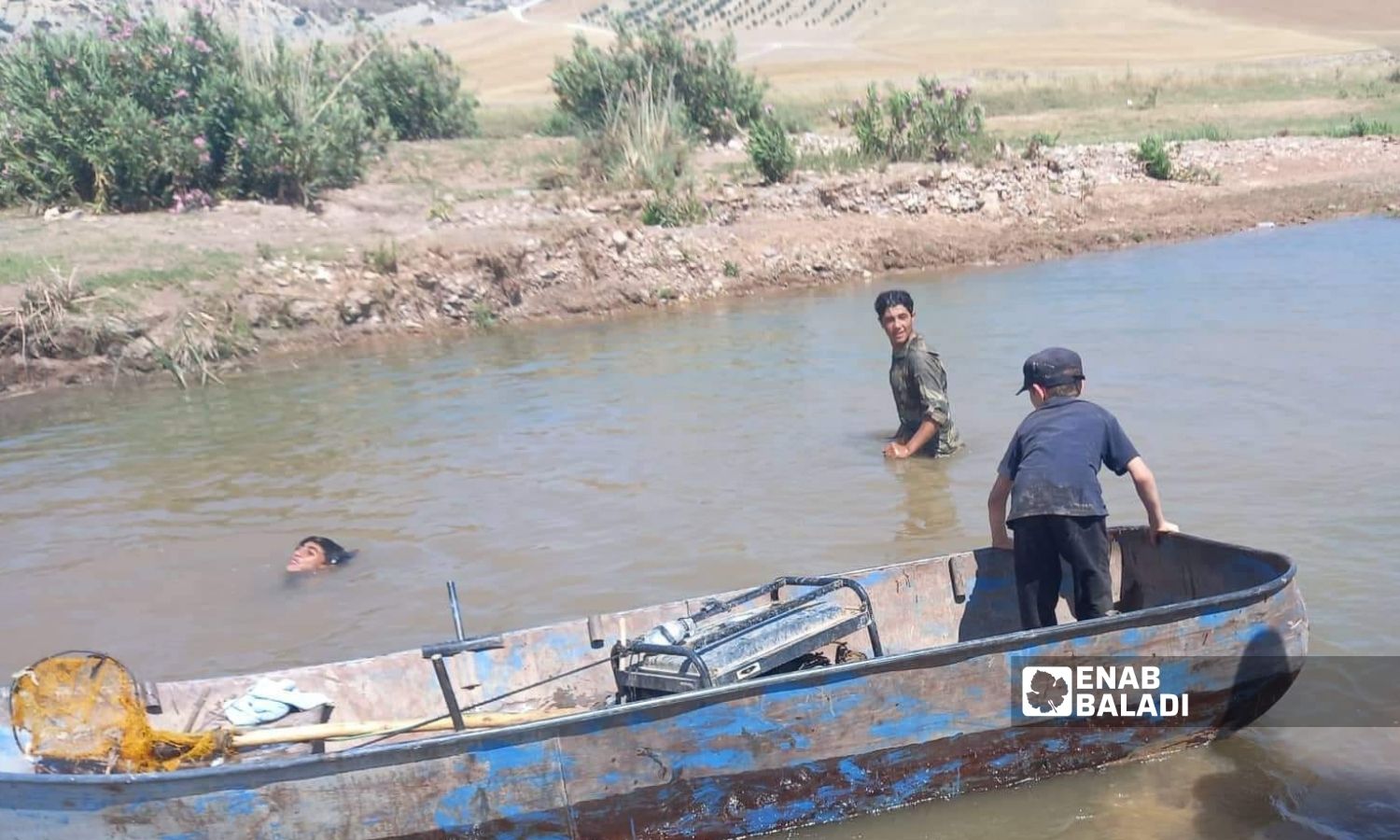



Idlib – Huda al-Kulaib
Despite his young age, Safwan al-Abed, 13, practices fishing in the Orontes (Asi) River in Idlib governorate after he inherited the profession from his father, who died of Covid-19 in 2021.
Al-Abed uses hand paddles and nets to catch all kinds of river fish with the help of his younger brother Alaa, 10, making the fishing trip take more than six hours a day.
For a child of his age, fishing is not easy, as he needs skill and experience to deal with river waters, which often form different currents. It must be handled with caution and knowledge so as not to cause the boat to lose its balance and sink, he tells Enab Baladi.
Al-Abed catches various types of river fish, the price of which varies according to its type, whether mullet, carp, Percidae, or other.
Some residents of the Idlib region began to search for sources of livelihood from nature, especially from the Asi river, which constitutes a job opportunity for fishing that is not limited to young men and adults but also children, given the low standard of living of most of the Idlib region’s residents, the spread of poverty, the high cost of living and the lack of job opportunities.
Since fishing requires experience and skill, this profession for children may be considered “dangerous,” but not without life-threatening challenges.
Coinciding with the World Drowning Prevention Day on 25 July, the Syria Civil Defense counted the rescue of 60 civilians who had nearly drowned since the beginning of this year, and its teams took them to hospitals.
According to the World Health Organization (WHO), drowning is one of the leading causes of death globally for children and young people ages 1–24 and the third leading cause of injury-related deaths overall; drowning tragically claims more than 236,000 lives each year.
WHO said in its statement on the occasion of World Drowning Prevention Day that more than 90 percent of drowning deaths occur in low- and middle-income countries, with children under the age of 5 being at the highest risk.
These deaths are frequently linked to daily, routine activities, such as bathing, collecting water for domestic use, traveling over water on boats or ferries, and fishing, and the impacts of seasonal or extreme weather events – including monsoons, WHO added.
Raed al-Mustafa, 14, owns a small boat on the banks of the Orontes River in Darkush town, which he has been using for nearly a year to catch fish to support his family of six.
His father had a traffic accident that left him with a permanent disability that affected his spine, preventing him from moving, and now he is the only breadwinner.
Al-Mustafa sets out on a daily search for what fish he can catch after throwing his nets and fixing them in more than one place in the river’s waters to catch roughly between ten and 15 kilograms of fish.
According to what he told Enab Baladi, al-Mustafa’s work is not without challenges and risks, the most important of which is exposure to sunstroke, as happened to him a short time ago, when the temperature rose to high levels, which led to him having a headache, high temperature, and general weakness in his body, which pushed him to receive treatment and rest at home for more than a week until his health condition improved and he returned to work.
As a result of the child’s exploitation by merchants of his young age and the purchase of his catch at low prices, the boy sometimes has to sell his catch himself, which means spending a whole day in the markets before returning to the fishing trip the next day.
Social worker Lama al-Mahmoud, 36, said that the complicated living conditions forced hundreds of children to leave school and head to the labor market in search of food.
Al-Mahmoud noted the danger of children working in difficult occupations that are not commensurate with their young age and their modest experience, especially in the fishing profession, which can expose them to drowning accidents in steep rivers such as the Orontes River.
The social worker called on the concerned authorities, through Enab Baladi, to bear the responsibility towards these children and others who are living life alone and to work to improve their financial conditions and try to return them to their school seats away from everything that threatens their future and their lives.
The UN defines child labor as works that place a heavy burden on children and endanger their lives, adding that “Child labor is a violation of international law and national legislation, as it either deprives children of education or requires them to bear the double burden of study and work.”
Syria’s high poverty rates lead to children being subjected to humanitarian violations, such as having to go to work, get married as minors, and be conscripted to fight, in order to help their families, according to the UN Children’s Fund (UNICEF).
if you think the article contain wrong information or you have additional details Send Correction